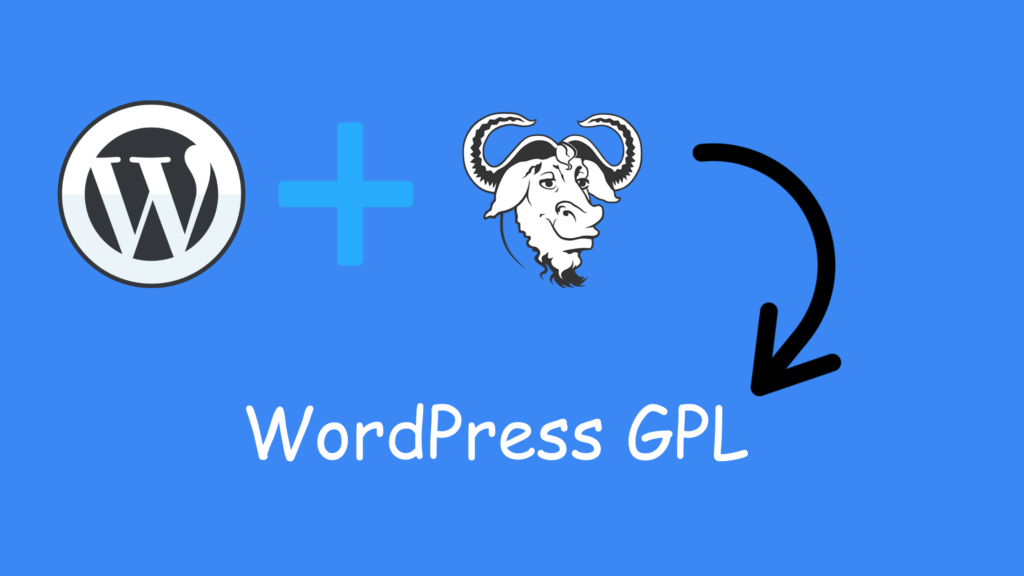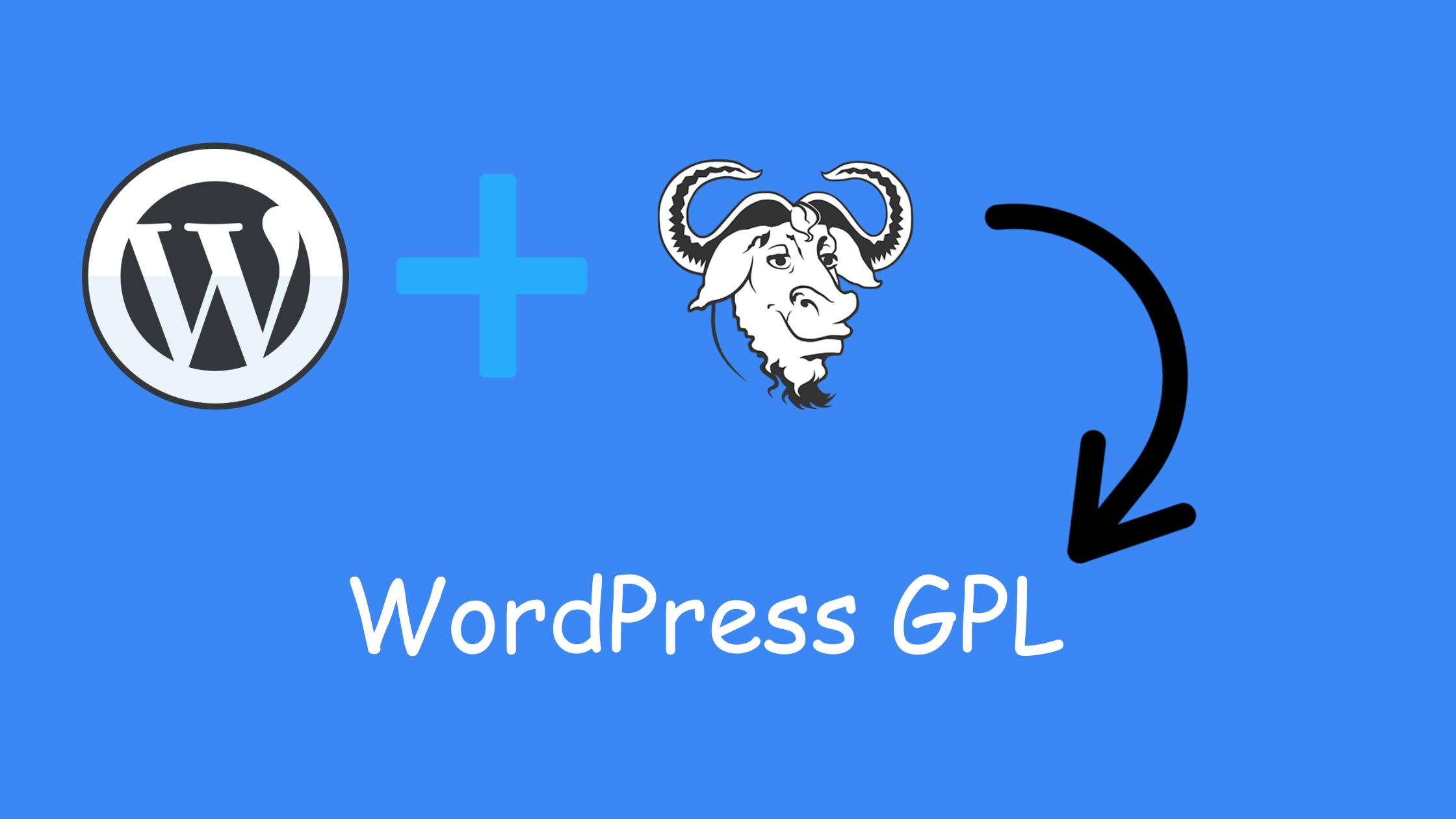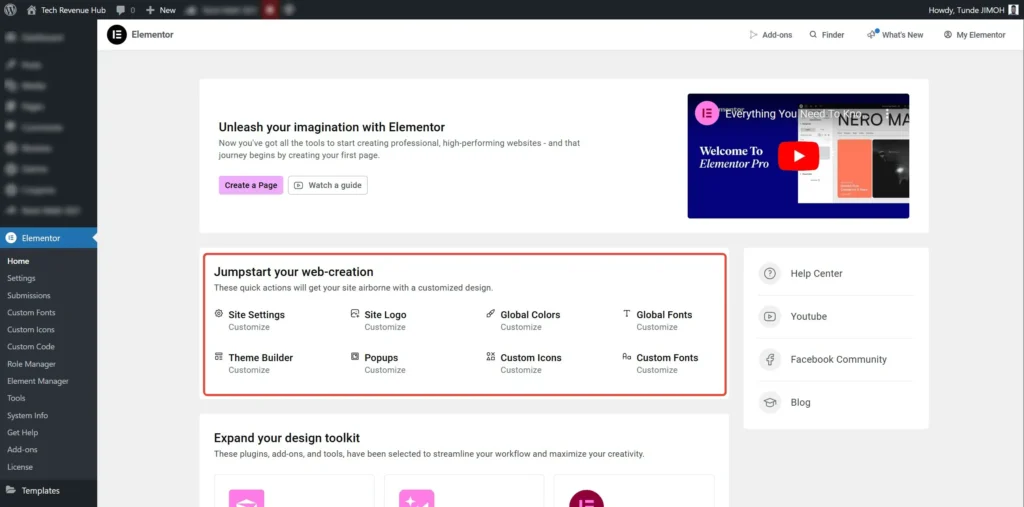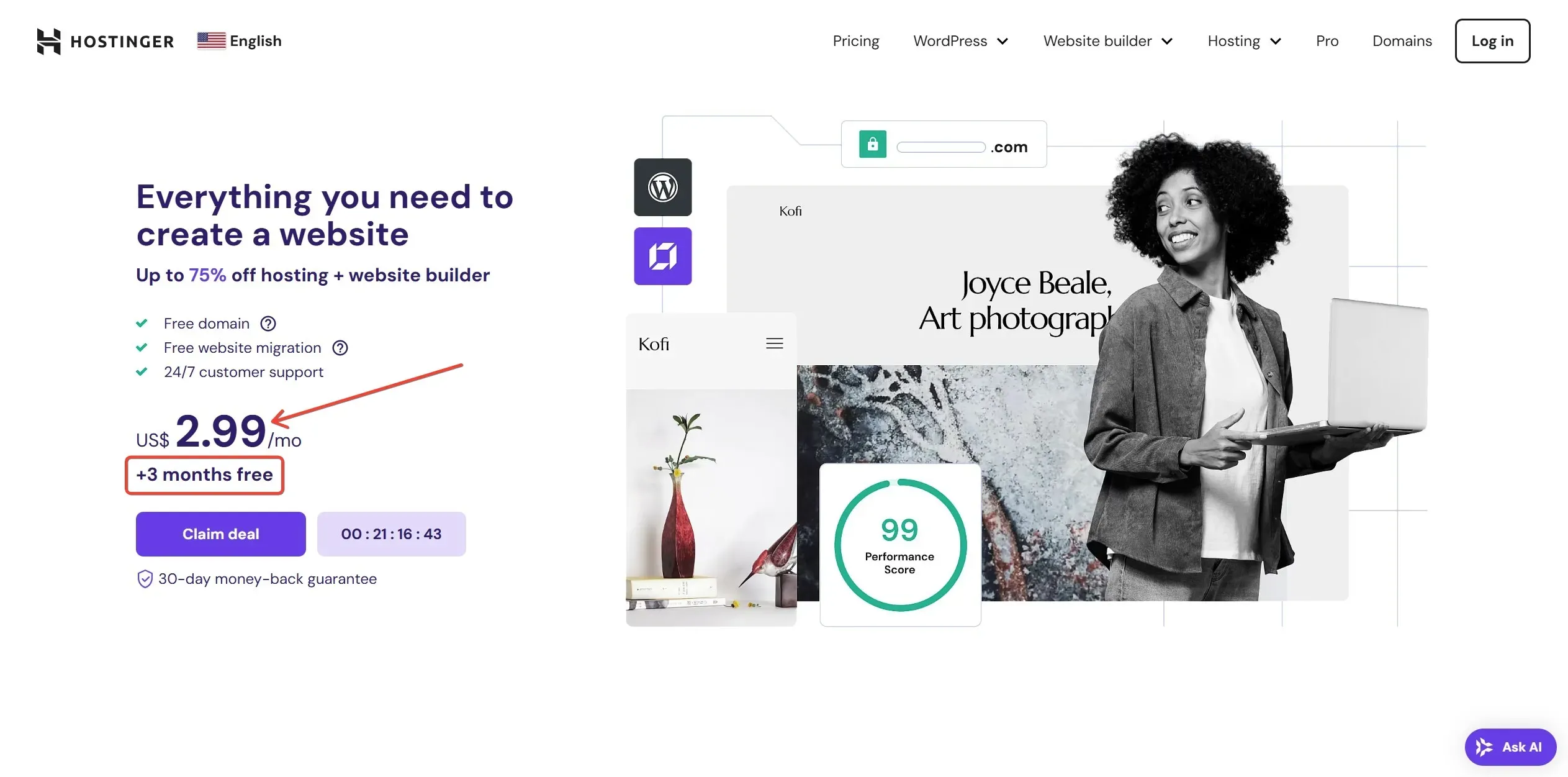WordPress is the most used content management system for a reason.
The platform has thousands of themes and plugins that add many features to websites.
It’s the ability of open-source software. When people are able to access the source code of an application, it becomes easier to find bugs and to introduce improvements.
This is arguably the reason why WordPress is where it is today.
Table of Contents
What’s GPL on WordPress?
GPL is the acronym of General Public License. It’s a free and open-source software license that gives users the ability to make edits and distribute main copies or modified versions of an application.
It’s a free software license that works well with open-source software. WordPress itself is licensed under GPL.
The GNU GPL license grants users four freedoms
- Freedom of use
- Freedom of modification
- Freedom of redistribution
- Freedom of distributing modified copies
Let’s briefly see what these freedoms mean.
Four freedoms of the GPL license

1. Freedom of use
The first freedom here counts on usage. Users are given maximum allowance to use the software as they see fit.
The usage freedom exempts potential users from any legal action that may arise from the way they utilize software.
2. Freedom of modification
The freedom of modification ushers potential users into an atmosphere where they can utterly access and modify an application to suit their goals.
That is to say, users are given free and non-withdrawable access to use and modify software anyhow they like.
3. Freedom of redistribution
Here’s where things go a bit further — not only do users have the freedom to use and modify the given application, they are also allowed to redistribute copies of the original product to help the open-source community.
4. Freedom of distributing modified copies
Users of GPL-licensed applications also have full right to distribute modified versions of the software.
This privilege balances the freedom of redistribution, allowing users to distribute both original and their edited works.
What’s WordPress GPL?
Having explained the General Public License. It’s now easy to tell what WordPress GPL is all about.

GPL + WordPress = WordPress GPL
WordPress GPL is what you get after blending the free software license (GNU GPL) with the content management system.
WordPress is an open-source software and it needs to marry a license that suits its nature. That’s why it chose the General Public License.
The explosion of “Free as in Freedom” between WordPress and the GPL is enormous.
All the GPL freedoms (from the privilege of usage, to modification and to distribution) are now being applied to WordPress.
That means WordPress and its derivative works (including plugins and themes) are governed by these freedoms.
In short, WordPress GPL gives users the right and freedom to (a.) use the CMS and its derivative works anyhow they want, (b.) modify the platform and derivatives to meet any goal, (c.) redistribute the platform and its works to help their neighbor, (d.) distribute modified versions of the CMS and derivatives.
Free As in Freedom Explained?
The word “free” in “free software” pertains to freedom, not price. You may or may not pay a price to get GNU software.
Richard Stallman, gnu.org.
According to the developer of the GPL license, Richard Stallman, the term “Free” in GPL software doesn’t mean price, rather it means the four freedoms explained above.
Therefore, a GPL product can be listed for free or paid (in terms of price) depending on the developer.
As a user of a WordPress product, users have an irrevocable right to use, modify, and distribute original or modified versions of software.
That right alone is what led people to mistake the term “Free” on GPL-licensed applications for price.
Normally, when someone has the overall right to use and even distribute your application. The translation will be — even when you list your product as “Paid software”, there are people who’ll get access to your product’s features for free, i.e., without paying you a dime.
These people can receive (your product) for free from their friends or colleagues who have paid the initial price set up by you, the developer.
The freedom of distribution made that possible.
So while GPL software is free in terms of freedom of usage and all the rest, it’s not mandatorily free in terms of price. It lies in the hands of the developer to decide how to charge for his product, despite it being open-source and free to tweak.
What are you paying for when you buy GPL Themes and Plugins?
If GPL-licensed applications are inherently free to use, tweak, and to distribute. What actually are developers charging for?
Remember, the GPL license doesn’t prohibit a program from being listed as paid. So, developers have come up with different provisions through which they earn from their labor.
WordPress developers charge for these three things. They don’t charge for the original product, because it’s free by the GPL.
- Product updates
- Customer support
- Bug fixes
When you buy a premium plugin, you’re ideally not paying for the product itself; you’re paying for updates and customer support.
Product updates are essential as it fights to stay current with the latest security technology.
Customer support service in its own wing is an important provision to customers. It helps them to continue moving anytime they face a problem.
As you might have noticed, when the license you bought for a wordpress plugin or theme expires, the product itself will remain functional except that you no longer get updates and customer support.
Why is WordPress released under GPL?
WordPress is released under GPL because it appears to be the best license that fits its free and open-source nature.
WordPress was in the game of fighting proprietary software. And it needs a midwife who can understand his operation well.
The GPL license offers a matching environment where users of WordPress can make the most out of open-source software.
With WordPress GPL, the source code of the CMS and its derivatives (including themes and plugins) are inspected, tweaked, and carried along by anybody. This brings improvements and betterment of the software faster.
GPL License vs other open-source software license?
Let’s see how the GPL license compares with its fellow free software licenses —
The GPL, which WordPress uses, is a “copyleft” license. This means any derivative work must also be licensed under the GPL, meaning the usual freedoms (to modify and distribute) are also applied to distributed or modified works.
This promotes software freedom but restricts the integration of GPL-licensed code with proprietary software.
LGPL (Lesser General Public License)

The LGPL is a more permissive variant of the GPL, allowing the software to be linked with non-GPL-licensed software.
This makes it best for libraries that need to be used within proprietary applications without enforcing the GPL’s copyleft requirements on the entire codebase.
The LGPL is commonly used for shared libraries to balance openness with compatibility, allowing proprietary applications to leverage LGPL-licensed code without licensing their own code under the GPL.
LGPL Comparison with GPL
- Copyleft strength: Weaker than GPL; LGPL allows linking with proprietary code.
- Use case: Often used for libraries to increase their compatibility with various projects, including commercial software.
BSD License (Berkeley Software Distribution License)

The BSD License is one of the most permissive free software licenses. It places minimal restrictions on how software can be used, modified, or redistributed. This means that BSD-licensed code can be incorporated into proprietary projects without releasing the source code.
However, it does require that the original copyright notice remains intact. This flexibility has made the BSD license popular for both open-source and proprietary projects.
BSD Comparison with GPL:
- Copyleft strength: Weak (not a copyleft license); does not enforce open redistribution of modifications.
- Use case: Ideal for developers who want maximum freedom in the use and distribution of their code, allowing closed-source adaptations.
MIT License
The MIT License is very similar to the BSD License in its permissiveness. It allows developers to use, modify, and distribute software with minimal restrictions, only requiring that the original copyright and license notice be retained.
This makes it highly compatible with other software, both open-source and proprietary, which has contributed to its popularity in the software community.
MIT License Comparison with GPL:
- Copyleft strength: None; modifications can be redistributed under any license, including proprietary.
- Use case: Widely used in both open-source and commercial projects due to its simplicity and permissive nature.
Apache License 2.0
The Apache License is permissive but includes a few more restrictions than the MIT and BSD licenses, such as requiring a NOTICE file and patent rights for the contributors.
It allows users to freely use, modify, and distribute the software, whether as open-source or proprietary. The only requirement is that original authors must be credited and patent rights are protected.
Comparison with GPL
- Copyleft strength: None; does not enforce open distribution of modifications.
- Patent protection: Apache License includes a patent grant which protects users from patent claims by contributors.
- Use case: Often chosen by projects needing permissiveness along with legal protection around patents.
The Benefits of the GPL for Users and Developers
The GPL license comes with a lot of benefits for WordPress users and developers. While it seems like it is more useful to users, it is also important on the side of the developers also.
GPL Benefits for WordPress Users
One might reasonably argue that the GPL implementation on WordPress favors users the most than actual developers.
As a WordPress user, you’re given the freedom to use the software and derivative work without facing any restrictions.
It’s a huge benefit as it enables potential users to utilize software however they want.
Secondly, the benefit of WordPress GPL to users is that they can combine or tweak anything to meet their expectations.
That means in reality that users don’t need to create an application that will suit their needs when they only have to edit a line of code to instruct a plugin or theme (can be any derivative) to perform their task.
The most important benefit of the GPL for Users is the freedom to redistribute and to distribute modified works.
Due to redistribution is allowed, users can escape the price (as in cost) that a developer had tied on his product.
Also, if it happened that a user changed the code of a software, he can still share it with his neighbors.
GPL Benefits for WordPress Developers
The implementation of GPL on WordPress does benefit developers, i.e., those who build for WordPress.
Helpful Community
With the open nature of the GPL license, WordPress has grown a community that’s more than just developers.
It’s a wide support system where developers and users work hand-in-hand, sharing feedback and ideas.
When users have the freedom to explore and modify, they can catch issues early and even suggest improvements.
This shared effort pushes innovation and creates a space where every idea can bring about something better.
Greater Number of Users
GPL licensing expands reach by removing barriers like upfront costs.
This accessibility means more people are willing to try and adopt GPL-licensed products.
More users translate into more feedback, and often, more visibility within the WordPress ecosystem.
For developers, this wider user base opens doors to monetization options, whether through premium services, support, or customization packages, all while growing their reputation in a thriving GPL community.
What are Nulled or GPL-redistributed Themes and Plugins?
Before getting to understand what Nulled Themes and Plugins are,
Let’s first look at the English meaning of the word “Nulling” — it is, simply put, the act of removing licensing restrictions placed on a product by modifying it.
Now, bring it to WordPress: the act of nulling means getting rid of the license key/activation field on plugins/themes so that more people can have access.
The next question — Is nulling legal?
Nulling can be legal most of the time because of the GPL, but it’s not always on the right side.
If nulling was used only on the PHP part of a theme or plugin, which the GPL governs, then it’s 100% legal.
However, if the plugin or theme concerned (like most developers do nowadays) uses some sort of tactics — like releasing other parts like the CSS, artwork, and images under a different license — then nulling becomes illegal unless the nuller swapped out those parts that are not GPL.
Here’s another question to address — Does nulling include malware?
Frankly speaking, the process of nulling doesn’t inherently include malware. The reason why folks tag nulled themes and plugins as full of threats is because of what has happened in the past.
This mostly falls on the side of free nulled themes/plugins distributors, where the adage exists — “If something is free, you basically become the product.”
This set of free premium WordPress distributors do inject backdoors and threats into their offers, risking the security of anyone who downloads from them.
How is nulling different from cracking and pirating when it comes to WordPress resources?
It’s easy to confuse these terms, but they actually mean different things, especially in the WordPress GPL space.
- Nulling in WordPress simply means editing a theme or plugin to remove the license activation screen, usually so users can access all features without entering a key. This is often done under the rights granted by the GPL, which allows modification of the PHP code. So, no — nulling isn’t hacking. It’s legal as long as it sticks to the GPL-covered parts of the software.
- Cracking is a different story. It usually refers to bypassing or breaking heavy security mechanisms that protect commercial software. In the WordPress context, this might mean decrypting encoded files, removing obfuscation, or tampering with licensing systems beyond what GPL allows. This crosses the legal line.
- Pirating is about unauthorized distribution. It’s when someone takes a plugin or theme — sometimes even including assets not licensed under the GPL, like images, fonts, or proprietary tools — and shares or sells it without following any licensing rules. That’s illegal no matter how you slice it.
So, to make sense of all this, it would mean — nulled themes and plugins are legal in nature, while cracked and pirated ones (which have to do with non-GPL parts) are illegal and could raise issues in a court of law.
Basically, a nulled theme or plugin usually lacks some features that the developer has marked proprietary (i.e., not GPL). And this is one of the consequences of using nulled themes and plugins.
What is a GPL Club?
A GPL club is a website that distributes nulled themes and plugins, allowing what was initially closed behind a paywall to be freely (as in price) available.
These platforms usually download from original developers and then distribute free copies to WordPress users.
The business of GPL WordPress clubs isn’t illegal at all since the GPL allows it. But it is not always moral when interpreted.
Developers can lose the revenue that will keep them up and running when a good number of people use these GPL websites. And when WordPress entrepreneurs fall as a result, they automatically close since they depend on original developers for their products.
It’s therefore advisable for anyone who must use these unofficial sources to keep everything to the minimum. Some people may argue that GPL websites can be beneficial for use cases like testing or preview (before deciding to commit to the plans of actual developers).
However, a good percentage of these people can also go overboard with it — such as keeping the plugins/themes even after testing.
It’s also worth noting that some GPL websites can inject backdoors and malware into their offerings in the pursuit of making more money. And this is especially common on platforms that distribute for free (as in price).
Conclusion
WordPress GPL, often called the “Bill of Rights,” is key to its success.
Developers typically encounter GPL early when they start building for WordPress, while many users remain unaware of it.
Understanding this license unlocks great opportunities for both users and developers, allowing them to fully benefit from WordPress’s open-source nature.
FAQs
What are GPL Themes and Plugins?
GPL themes and plugins are products released under WordPress. Due to the connection of the CMS with the General Public License, all derivative works of WordPress inherit the same open-source nature.
GPL themes and plugins can be used however you want. They can be modified to meet the user’s expectations. And they can even undergo distribution without raising any issues.
Why is the WordPress GPL not widely discussed?
WordPress GPL is a sensitive topic. When discussed, users are enlightened about their freedoms on the CMS. And it can lead them to go overboard with those rights.
Everyday users do not know their ability to distribute derivative works of WordPress. When such ability is understood, it can bring positive and negative outcomes.
That’s a good reason why the topic isn’t yet widely discussed.





